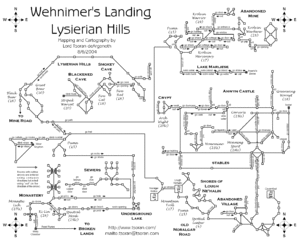Lysierian Hills
Error: Image is invalid or non-existent.
The Lysierian Hills are situated a fair distance northeast of Wehnimer's Landing, connected to the town by the Old Mine Road. The hills were once more populous, but the local miners and fishermen have been driven out by krolvin raiders. Rumors speak of a secret underground monastery where a rune portal opens to a distant, bleak realm.
Regions within the Lysierian Hills include:
- Castle Anwyn
- Smokey Caverns
- Abandoned Mine
- The Monastery
- Shores of Lough Ne'Halin
- Abandoned Village
- Lake Marliese
Official Description
The simple beauty of the rolling Lyserian Hills covered in silvery mists is the signature feature of the entire area. Unfortunately, the local inhabitants that once prospered in the hills have long since been driven away by Krolvin incursions and the lands have been abandoned to nature. Despite the demise of the local mining and fishing village, tourists still travel to the area to enjoy the scenery, though never without sword or escort.
Behind the Scenes
The Lysierian Hills is likely an allusion to the Elysian Fields of Greek mythology, essentially the beautiful and good part of the Underworld. The surrounding regions are subtextually related to underworld themes. Shadow Valley would have originally been located in the Lysierian Hills, and was based on Lovecraft's "The Mound" with an underworld kingdom. The Broken Lands is patterned off the Underworld of the Dreamlands from Lovecraft's "The Dream-Quest of Unknown Kadath". Castle Anwyn is based on the Welsh word Annwn meaning the Celtic Otherworld, including subtle allusions to Glastonbury Abbey and St. Patrick's Purgatory, which is entered by traveling underground through fairy mounds. The pumas refer to shape-shifting shamans from Mesoamerican mythology, which is related via Lovecraft to the serpent demon of Shadow Valley. The contraction "Lys" might be emphasizing Gawain and the Lady of Lys, related to its Celtic roots and being the Welsh word for a royal court.
External Links
- Map of Lysierian Hills on outdoorelanthia.com
